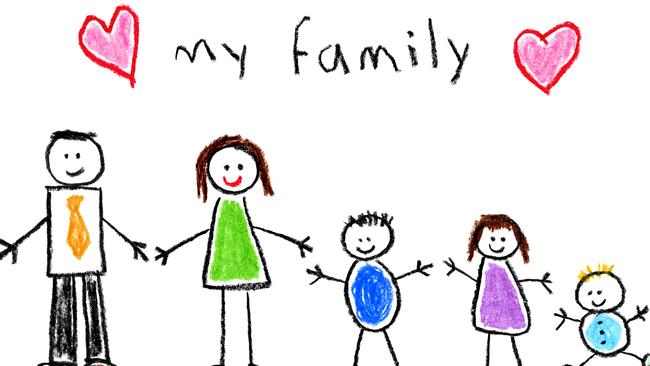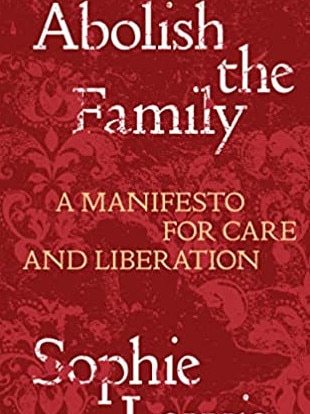Is it time to abolish the idea of family?
Can the family provide us with all the love and care we need? Not according to author Sophie Lewis, who argues mother love is a fiction, and families are oppressive.

The thoughts of a nulliparous woman on the biological experience of motherhood should, in my opinion, be taken as seriously as a pope’s understanding of sexual congress. Yet “trad-rad” feminists have been weighing in on the subject for decades. The latest is Sophie Lewis, a red-lipsticked, jewellery-festooned, Oxford-educated Marxist in her mid-30s who resides in Philadelphia with her “American wife and boyfriend”, although it is unclear whether said boyfriend is hers, her wife’s, mutual, or simply a roommate who identifies as such (“The Boyfriend”).
I will return to this point later.
Abolish the Family: A Manifesto for Care and Liberation, Lewis’s new polemic, is, in many respects, the rightful heir to Shulamith Firestone’s The Dialectic of Sex: The Case for Feminist Revolution (1970), a book whose flagrant idiocy can be forgiven on twin grounds: the author’s mental fragility and youth (she was 25 on its publication), and the era’s rudimentary understanding of developmental neuroscience.
Lewis, on the other hand, has no such excuses.
For all her reproductive utilitarianism and ululating idealisation of “comrades”, Lewis addresses only the tertiary-educated in the book. She has an elitist style – the references alone presuppose an exclusive First World education. Clearly, the book’s intended audience is not one of potato peelers, rest room attendants, turnip farmers, or even Russia’s Vladimir Putin, whose partner is a sexy gymnast; clearly, she seeks to impress her authority on, rather than her parity with, the reader.
While all Marxist feminists are equal, it appears that some are more equal than others. Yet her high-blown, hair-tossing prose serves an important purpose: to distract from the fact that her central argument amounts to no more than a philosophical fart.
Fuelled by her own, widely reported and fantastically unhappy experience of being parented, Lewis’s ideology is founded on the idea that mothers are a very bad idea, mother love is a fiction, and families are oppressive. Her late mother, a well-educated suicidal girlboss who was given no funeral because she’d alienated everyone other than her “damaged and damaging nuclear kin”, employed a series of “insufficient” au pairs to raise her daughter.
-
Her high-blown, hair-tossing prose serves an important purpose: to distract from the fact that her central argument amounts to no more than a philosophical fart.
-
Lewis, in a video about her mother’s 2019 death, is not only visibly traumatised by the experience – her breathing accelerates; she looks as if she is about to cry – but stifles her feelings, whining about being unprepared for grief. Beneath these words is the anguish of an incompetently-mothered child who now demands to be mothered by the state. Having had no maternal “holding environment” to contain and process overwhelming emotions, Lewis seeks support in her grieving from safely-detached “professionals”.
On the basis of what she decides is a cultural “insufficiency”, Lewis conjures a Utopia in which women like her mother, whose needs were also neglected in childhood, are relieved of the burden of their own inadequacies. She envisions a world in which we all mother each other, overflowing with the impulse to indiscriminately care.
“So many families are extremely unhappy!” she exclaims. “And this extreme unhappiness feels unique, because its structural character – like the structure of capitalism – is cunningly obscured from view.”
The possibility that this “extreme” unhappiness may result from factors other than the structural character of the family seems to elude Lewis. Instead, she excitedly proposes a woke shambles: “As a matter of urgency, let us take this to heart, opening anew what Lola calls ‘the possibility that we could reorganise the family and the buildings we live in and the food we eat and the education we receive and start taking things for free in order to raise children in ways that make sacrifice or regret or biological drives or gendered alienation impossible.”
Secure in her tiny little privileged academic universe, Lewis wants the state to return “especially dependent humans” – that is to say, children – “to the arms of the few caregivers it tends to recognise and insist on deprivatising care, contesting ‘parental rights,’ and imagining a world in which all people are cared for by many by default.”

A species of evolution from the state-supported, SS-affiliated association Lebensborn (maternity homes in which mostly unmarried mothers gave birth anonymously to “racially pure” infants), Lewis’s vision is not quite as disconcerting when her maternal lineage is taken into account. As early 20th century childcare manuals show, German child rearing was almost improbably cruel.
Lewis, who was raped at the age of 13, believes that children are not to be addressed as property because territoriality is bad. Somehow, she also believes that adults can be classed as property, which is evidenced by her regular emphasis on the status of the woman with whom she shares her life (“my” wife, rather than, say, a “familiar, deprivatised human in the general vicinity”).
Adopting her mother’s prism, Lewis understands parenthood as a “hellworld of sheer exhaustion” featuring “a despotic distribution of responsibility for and power over younger people” (aka children). But the real hellworld is enduring the desperate attempts of a traumatised, over-educated, queer white middle-class polyamorist to eradicate, through the abolition of attachment, the agony of losses and abuses she does not know how to metabolise.
Antonella Gambotto-Burke’s new book, Apple: Sex, Drugs, Motherhood and the Recovery of the Feminine, is now available online.
Abolish the Family: A Manifesto for Care and Liberation
By Sophie Lewis
Verso, Nonfiction
128pp, $24.99





To join the conversation, please log in. Don't have an account? Register
Join the conversation, you are commenting as Logout